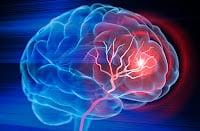Elevated symptoms of posttraumatic stress disorder (PTSD) are more common after stroke mimics than...
Increased Risk of Stroke Linked to Stress at Home, Work

Experiencing multiple stressful events or chronic stress at home or at work over the course of a year raises the risk of several types of stroke, a study published today in JAMA Network Open has found. However, the study also suggests that having a greater sense of control over the situations and experiences that affect one’s life—a greater locus of control—may help counter the impact of stress on stroke risk.
Catriona Reddin, M.B., of the University of Galway in Ireland and colleagues analyzed data from 26,812 participants in the INTERSTROKE study, an international case-control study of risk factors for stroke. Among the participants, 13,350 had been admitted to a hospital with a first ischemic or hemorrhagic acute stroke, and 13,462 had no history of stroke. The researchers measured stress in the preceding year using a standardized questionnaire that asked about home stress, work stress, financial stress, and stressful life events. They defined stress as feeling irritable or filled with anxiety or having trouble sleeping because of conditions at work or home. Participants who had strokes were instructed to answer the questions with respect to the time before their stroke.
The participants also rated, on a scale of 1 to 5, how much control they felt they had over what happens in life and at work. For perceived life control, participants were asked to rate their agreement with the statement, “I feel what happens in my life is often determined by factors beyond my control.” For perceived work control, they were asked to rate their agreement with the statement, “At work, I feel I have control over what happens in most situations.”
Participants who reported having experienced several periods of home stress or permanent home stress had 1.95 times the odds of having any stroke, 1.82 times the odds of having an ischemic stroke, and 2.55 times the odds of having intracerebral hemorrhage. Those who reported several periods of work stress or permanent work stress had 2.7 times the odds of having any stroke, 2.27 times the odds of having an ischemic stroke, and 5.2 times the odds of having cerebral hemorrhage. Having a higher locus of control at home was associated with a reduced odds of having any stroke, but having a higher locus of control at work did not appear to affect stroke risk.
The researchers noted several potential reasons for the association between stress and stroke.
“Acute stress may trigger an event by leading to activation of the sympathetic nervous system, causing vasoconstriction and plaque rupture in vulnerable individuals,” they wrote. “Chronic stress is hypothesized to cause dysregulation of the sympathetic system, endothelial dysfunction, and atherosclerosis.”
The researchers concluded, “Our findings … support the need to develop generalizable, effective, and feasible interventions to reduce psychosocial stressors.”
For related information, see the Psychiatric News article “Depression Increases Stroke Risk, Even After Symptoms Remit.”
(Image: iStock/peterschreiber.media)
Don't miss out! To learn about newly posted articles in Psychiatric News, please sign up here.






